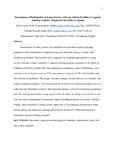Determinants of Participation of Young Farmers with and without Disability in Capacity building Programs Designed for the Public in Uganda
Abstract
Participation of young farmers with disabilities in agricultural capacity-building
programs in their communities is important as poverty reduction strategy in people with
disabilities in Uganda. This research study comparatively examined participation of young
farmers with and without disabilities in capacity-building programs designed for the public in
Northern and Eastern Uganda. The study employed a comparative, mixed methodology, cross
sectional research designs involving 774 young farmers composed of 388 with disabilities and
386 who had no disabilities. The sample selection strategies involved the use of a stratified, and
random sampling techniques. This research utilized an interviewer-administered paper survey in
collecting data. Descriptive statistics and regression analyses were used in analysing quantitative
data. The findings indicate that young farmers with a disability and being contacted face-to-face
were less likely to participate in community capacity-building programs. In contrast, Northern
Uganda, those contacted in a group setting, application of sign language interpretation, being
female, and having supportive training staff increased the chances of their participation in
community capacity-building programs

